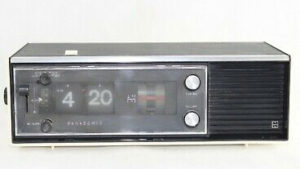My mother loved listening to the radio. When I was young, she had 1010 WINS tuned in on a tiny little black “flip” clock radio in our kitchen. You could faintly hear the tinny news tone upstairs, with the time check every three minutes or so, as we filtered downstairs to breakfast. To this day, the staccato news break sound brings me right back to the 1970’s, like an old friend.

The radio trailed us in the car too, which in the warmer months included listening to the New York Mets games on WOR 710 in the afternoons or evenings. It did help pass the time on our way to the beach. Back at home, when she couldn’t sleep, I remember that she’d retreat to one of my sister’s rooms, as they had moved on to college and jobs by then. She’d settle into one of their beds, with the radio on low, listening to some talk show or WQXR, New York’s classical music station, or one of the Mets games if they were on the west coast.
In her later years, she had my father – who was a very good trim carpenter – mount a radio right above the kitchen sink so that when she was washing up the dishes, she could listen to the news, a ball game or opera. She’d fiddle with the dials, decide on a program and happily tidy things up. Radio was a central part of our life. The news, the time, the weather. A game or the opera. It was all very agreeable to me.
Unlike today’s generations, my mother grew up with radio as a teenager. While first used in the late 1800s, radios only started to become generally available for private civilian use after World War I. Westinghouse received the first license to set up a station (KDKA) in Pittsburg, PA, in 1920. ATT released the first radio commercial in 1923. By the late 20s, competitive networks such as CBS and NBC were established.
By the early 1930s, more than half of all homes in the US had a radio, including my mother’s family. My grandfather fussed with the dials and they all listened to their favorite shows. My aunt told me that everyone in their family was an inveterate radio listener.
In the run-up to World War II, it wasn’t surprising that radio was being used for propaganda purposes. It was cheap entertainment for the listener, and audiences loved it globally. At the same time, it was a very inexpensive way to reach millions of people. Radio’s underbelly was that anyone could say anything. Many people recognized the opportunity to sway people’s thoughts, both for the good and also, for the bad. Propaganda became a weapon every nation could use with the emergence of electronic mass communications. Even in 2020, we are grappling with message, content and control. Radio remains very relevant.
With the plethora of radio options available today, the evolution of headphones and the advent of podcasting, I think my mother must be in radio heaven.
Bonus Nugget: I love listening to radio stations and podcasts in the car, at night and when I can’t sleep. The apple does not fall far from the tree.

Amazing imagery mama! I can see Grandma in the kitchen ?